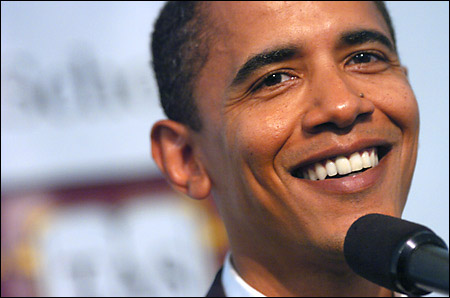Rights, equality center stage at HLS events
Obama talks about Katrina’s aftermath at gathering

Two events at Harvard Law School (HLS) last week (Sept 15-18) focused attention on civil rights and economic equality and included a call to action from U.S. Sen. Barack Obama.
The three-day Celebration of Black Alumni (CBA) began last Friday (Sept. 16) and came on the heels of Thursday’s grand opening of the new Charles Hamilton Houston Institute for Race and Justice.
The institute, to be led by Jesse Climenko Professor of Law Charles Ogletree, celebrates a 1923 Harvard Law School graduate who influenced a generation of civil rights lawyers and who laid the groundwork for the U.S. Supreme Court’s landmark Brown v. Board of Education decision that ended legal segregation in America’s schools.
Obama, an Illinois Democrat who graduated from Harvard Law School in 1991, delivered the keynote address at Saturday’s Celebration of Black Alumni luncheon to crowd of several hundred gathered in a tent outside of Langdell Hall. Obama said coverage of hurricane Katrina’s aftermath “seared” those who watched it because it exposed the inequity of a society where evacuation orders didn’t account for those too poor to own a car or to rent an out-of-town hotel room.

He ascribed the evacuation failures and the “achingly slow” response in the storm’s aftermath not to an active prejudice on the part of the Bush administration, which has been the focus of much of the criticism, but to a “passive indifference” he said is common in America.
But there is enough blame to go around to both the government and everyone else, Obama said, including those gathered for Saturday’s event, who were also aware of the grinding poverty in New Orleans, but who didn’t take action.
“Our anger at the Bush administration lets us off the hook,” Obama said. “We need to ask whether we’re doing all that we can, not just some of what we can.”
Obama said Democrats and others working to help the poor should take the Bush administration at its word when it expresses a newfound determination to help the poor, adding that he’s willing to try anything that works.
Harvard President Lawrence H. Summers addressed both the Houston Institute’s opening on Thursday and the Celebration of Black Alumni on Friday.
On Thursday, Summers told a crowd gathered in Ames Hall’s Austin Courtroom that if Houston were present today, he might be pleased with the many signs of progress in achieving racial equality both in broader society and at Harvard Law School, where 13 percent of the incoming class is black.
But Houston would also likely remind them that their work is far from complete, as evidenced by the continuing need for affirmative action programs, by the disproportionately high representation of black men in America’s prisons, and by the fact that one in four African Americans doesn’t have a bank account.

“Prejudice remains, in countless ways, large and small,” Summers said. “He [Houston] would tell us to look at our television screens and to ponder the images of New Orleans.”
The opening day of the Charles Hamilton Houston Institute was dedicated to Houston, featuring talks and panel discussions on his life, the Brown v. Board of Education lawyers he influenced, the Brown case itself, and the future mission of the institute. It closed with an address by Princeton University Professor Cornel West.
The Celebration of Black Alumni was the second such gathering and featured discussions on a wide variety of topics, ranging from the influence of HLS alumni to human rights, to corporate law, to fulfilling the promise of the Brown decision. It featured speeches by Summers, Obama, and HLS Dean Elena Kagan, the Charles Hamilton Houston Professor of Law.
Sharon Jones, one of the event’s co-chairs, said she agreed to organize the second Celebration of Black Alumni because the first, held in 2000, meant so much to her.
As a black woman who graduated from HLS in 1982, Jones said she entered a legal profession that had few women, fewer blacks, and even fewer black women. As a consequence, she was often the first black woman to work at a particular place or to take on a particular task.
“I was isolated and I felt the experiences due to race and gender were unique to me, so I didn’t express them,” Jones said.
When she attended the first Celebration of Black Alumni, she said, she realized that she was not alone, that hundreds of others were facing the same challenges.
“Harvard teaches us that we are special because we come from here. CBA taught me that though special, I was not unique,” Jones said. “We are all part of the same village.”




